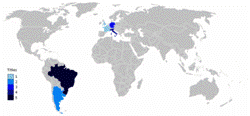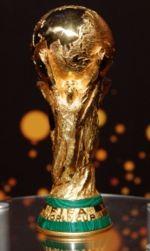WORLD CUP
|
|
Founded |
1930 |
Region |
International (FIFA) |
Number of teams |
204 (Qualifiers for 2010) |
Current champions |
|
Most successful team |
|
FIFA World Cup |
|
The FIFA World Cup, occasionally called the Football World Cup, but usually referred to simply as the World Cup, is an international association football competition contested by the men's national teams of the members of Fédération Internationale de Football Association (FIFA), the sport's global governing body. The championship has been awarded every four years since the first tournament in 1930, except in 1942 and 1946, due to World War II.
The tournament consists of two parts, the qualification phase and the final phase (officially called the World Cup Finals). The qualification phase, which currently take place over the three years preceding the Finals, is used to determine which teams qualify for the Finals. The current format of the Finals involves 32 teams competing for the title, at venues within the host nation (or nations) over a period of about a month. The World Cup Finals is the most widely-viewed sporting event in the world, with an estimated 715.1 million people watching the 2006 tournament final.
In the eighteen tournaments held, only seven nations have won the title. Brazil is the most successful World Cup team, having won the tournament five times. The current World Champions, Italy, follows with four titles, while Germany holds three. The other former champions are Uruguay (who won the inaugural tournament) and Argentina with two titles each, and England and France with one title each.
The most recent World Cup Finals were held in Germany, where Italy was crowned champion after beating France in the final. The next World Cup Finals will be held in South Africa, from June 11, 2010 to July 11, 2010, and the 2014 Finals will be held in Brazil.
FORMAT
Qualification
Since the second World Cup in 1934, qualifying tournaments have been h eld to thin the field for the final tournament. They are held within the six FIFA continental zones(Africa, Asia, North and Central America and Caribbean, South America, Oceania, Europe), overseen by their respective confederations. For each tournament, FIFA decides the number of places awarded to each of the continental zones beforehand, generally based on the relative strength of the confederations' teams, but also subject to lobbying from the confederations.
eld to thin the field for the final tournament. They are held within the six FIFA continental zones(Africa, Asia, North and Central America and Caribbean, South America, Oceania, Europe), overseen by their respective confederations. For each tournament, FIFA decides the number of places awarded to each of the continental zones beforehand, generally based on the relative strength of the confederations' teams, but also subject to lobbying from the confederations.
The qualification process can start as early as almost three years before the final tournament and last over a two-year period. The formats of the qualification tournaments differ between confederations. Usually, one or two places are awarded to winners of intercontinental play-offs. For example, the winner of the Oceanian zone and the fifth-placed team from the Asian zone will enter a play-off for a spot in the 2010 World Cup.From the 1938 World Cup onwards, host nations have received an automatic berth in the finals. This right was also granted to the defending champions between 1938 and 2002, but was withdrawn from the 2006 FIFA World Cup onward, requiring the champions to qualify. Brazil, winners in 2002, thus became the first defending champions to play in a qualifying match.
Final tournament
The current finals tournament features 32 national teams competing over a month in the host nation(s). There are two stages: a group stage followed by a knockout stage.
In the group stage, teams compete within eight groups of four teams each. Eight teams are seeded (including the hosts, with the other teams selected using a formula based on both the FIFA World Rankings and performances in recent World Cups) and drawn to separate groups. The other teams are assigned to different "pots", usually based on geograp hical criteria, and teams in each pot are drawn at random to the eight groups. Since 1998, constraints have been applied to the draw to ensure that no group contains more than two European teams or more than one team from any other confederation.
hical criteria, and teams in each pot are drawn at random to the eight groups. Since 1998, constraints have been applied to the draw to ensure that no group contains more than two European teams or more than one team from any other confederation.
Each group plays a round-robin tournament, guaranteeing that every team will play at least three matches. The last round of matches of each group is scheduled at the same time to preserve fairness among all four teams. The top two teams from each group advance to the knockout stage. Points are used to rank the teams within a group. Since 1994, three points have been awarded for a win, one for a draw and none for a loss (prior to this, winners received two points rather than three). If two or more teams end up with the same number of points, tiebreakers are used: first is goal difference, then total goals scored, then head-to-head results, and finally drawing of lots (i.e. determining team positions at random). The knockout stage is a single-elimination tournament in which teams play each other in one-off matches, with extra time and penalty shootouts used to decide the winner if necessary.
It begins with the "round of 16" (or the second round) in which the winner of each group plays against the runner-up of another group. This is followed by the quarter-finals, the semi-finals, the third-place match (contested by the losing semi-finalists), and the final.
WINNERS AND FINALISTS
Team |
Titles |
Runners-up |
5 (1958, 1962, 1970, 1994, 2002) |
2 (1950*, 1998) |
|
4 (1934*, 1938, 1982, 2006) |
2 (1970, 1994) |
|
|
3 (1954, 1974*, 1990) |
4 (1966, 1982, 1986, 2002) |
2 (1978*, 1986) |
2 (1930, 1990) |
|
2 (1930*, 1950) |
- |
|
1 (1998*) |
1 (2006) |
|
1 (1966*) |
- |
|
- |
2 (1974, 1978) |
|
|
- |
2 (1934, 1962) |
- |
2 (1938, 1954) |
|
- |
1 (1958*) |
* = hosts
^ = includes results representing West Germany between 1954 and 1990
# = states that have since split into several independent nations
